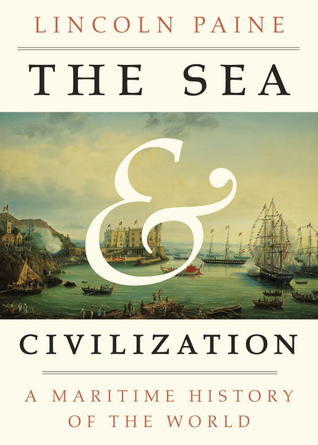
A monumental retelling of world history through the lens of maritime enterprise, revealing in breathtaking depth how people first came into contact with one another by ocean and river, lake and stream, and how goods, languages, religions, and entire cultures spread across and along the world’s waterways, bringing together civilizations and defining what makes us most human. Lincoln Paine takes us back to the origins of long-distance migration by sea with our ancestors’ first forays from Africa and Eurasia to Australia and the Americas. He demonstrates the critical role of maritime trade to the civilizations of ancient Egypt, Mesopotamia, and the Indus Valley. He reacquaints us with the great seafaring cultures of antiquity like those of the Phoenicians and Greeks, as well as those of India and Southeast and East Asia, who parlayed their navigational skills, shipbuilding techniques, and commercial acumen to establish thriving overseas colonies and trade routes in the centuries leading up to the age of European expansion. And finally, his narrative traces how commercial shipping and naval warfare brought about the enormous demographic, cultural, and political changes that have globalized the world throughout the post–Cold War era. This tremendously readable intellectual adventure shows us the world in a new light, in which the sea reigns supreme. We find out how a once-enslaved East African king brought Islam to his people, what the American “sail-around territories” were, and what the Song Dynasty did with twenty-wheel, human-powered paddleboats with twenty paddle wheels and up to three hundred crew. Above all, Paine makes clear how the rise and fall of civilizations can be linked to the sea. An accomplishment of both great sweep and illuminating detail, The Sea and Civilization is a stunning work of history.
Author

Lincoln Paine is the author of five books and more than fifty articles, reviews, and lectures on maritime history. His books include the award-winning The Sea and Civilization: A Maritime History of the World (Knopf, 2013), Down East: A Maritime History of Maine (Tilbury House, 2000), and Ships of the World: An Historical Encyclopedia (Houghton Mifflin, 1997). From 2009 to 2012, Lincoln was the guest curator and archivist of the Norman H. Morse Collection of Ocean Liner Materials at the Osher Map Library, University of Southern Maine in Portland, Maine, and since 2006 he has been an editor of Itinerario: International Journal on the History of European Expansion and Global Interaction, published at Leiden University, The Netherlands, in conjunction with Cambridge University Press. He serves on the board of the Maine Maritime Museum in Bath (one of the ten best maritime museums in the world, according to marineinsight.com). He and his wife live in Portland. Their daughters happen to be named for ships.